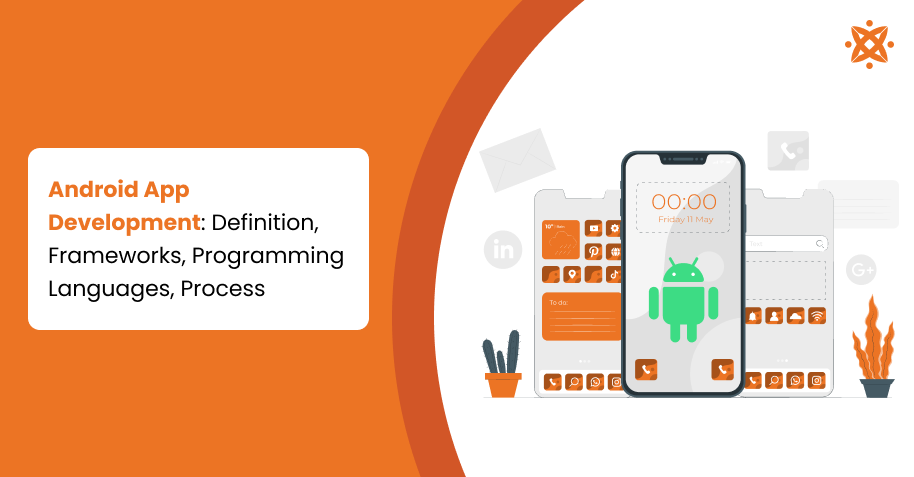
Android app development is the process of building, testing, and launching mobile applications that run on Android devices. If you're planning to create an app, you'll be working with smartphones, tablets, and even wearable technology. Since Android is open-source, you can customise applications to meet specific needs more efficiently.
The best frameworks and tools for Android app development include Android Studio, Flutter, and Jetpack Compose. Android Studio offers emulators and templates for efficient coding. Flutter lets you build apps for both Android and iOS with fast deployment. Jetpack Compose makes UI design easier compared to traditional methods.
Programming languages used for Android app development are Kotlin, Java, and Dart. Kotlin. Google's preferred choice since 2017, helps you write cleaner code and reduces crashes. Java ensures compatibility across different apps, making it a reliable option. Dart powers Flutter, allowing you to build cross-platform apps efficiently
Developing an Android app starts with an app idea, design the Android app architecture, code in Android Studio, test on emulators, and deploy to the Google Play Store.
The difference between Android app development and iOS app development is the tools, programming languages, and security risks involved. Android development uses Android Studio and Kotlin, serving around 70% of mobile users, while iOS development relies on Xcode and Swift, covering 29% of users. Android's open-source nature gives you more flexibility for customisation but comes with higher security risks. In contrast, iOS operates within a closed ecosystem, offering stricter security and controlled app distribution.
According to StatCounter (Global Stats), titled "Mobile Operating System Market Share Worldwide," published in January 2024, Android holds 70% and iOS 29% of the market.
What Is Android App Development?
Android app development is the process of creating mobile applications for devices that run on the Android operating system. It involves designing, coding, testing, and launching apps that work on Android phones, tablets, and wearables using tools like Android Studio.
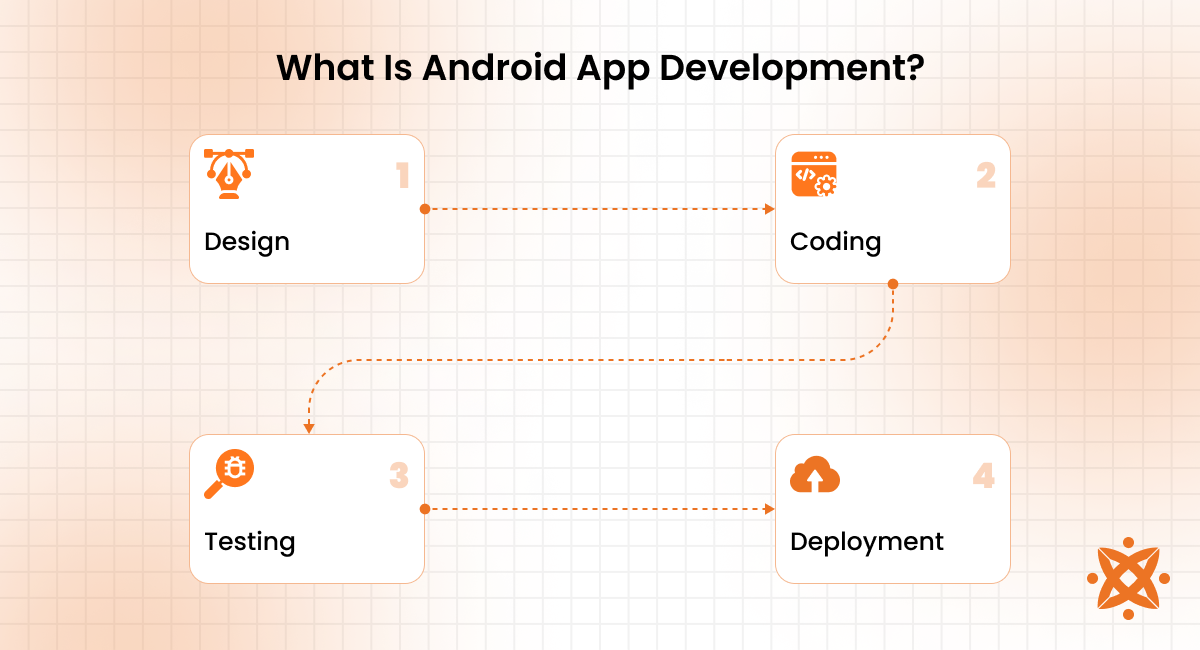
Android app development is important because Android runs on smartphones, giving you access to a large audience. Whether you want to build an app for entertainment, productivity, education, or commerce, Android allows you to engage users, automate tasks, offer learning tools, or sell products efficiently.
Examples of Android apps include WhatsApp for messaging, Google Maps for navigation, and BBC News for updates. These apps show how you can create solutions that improve communication, travel, and access to information in daily life.
What Is an Android App?
An Android app runs software on devices using the Android operating system, designed for phones, tablets, and smartwatches. Whether you need an app for messaging, browsing, or shopping, Android apps are built to support everyday tasks and enhance mobile experiences.
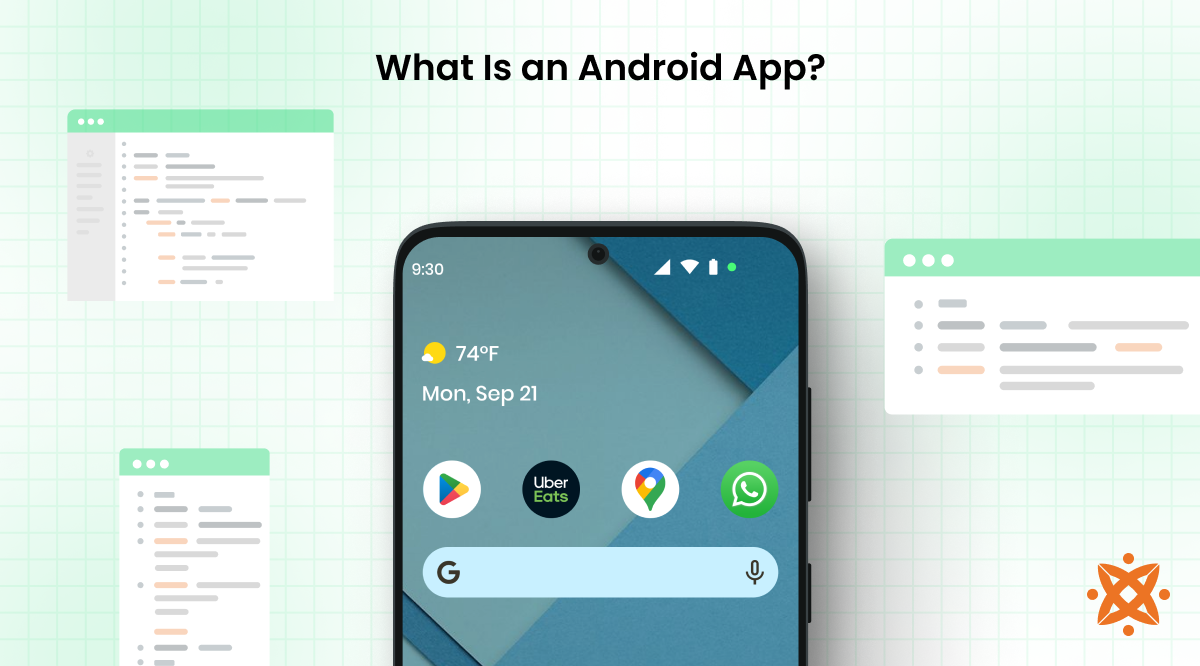
The architecture of an Android app consists of key components: activities, services, and content providers. Activities control what you see on the screen, services handle background tasks like music playback, and content providers allow apps to share data. These elements are managed through a manifest file, which defines app permissions and structure.
The advantages of Android apps include wide accessibility, user customisation, and low-cost development. With Android, you can reach a large audience, adjust app settings to suit your preferences, and develop apps at a lower cost compared to other platforms.
What Is the Definition of Android?
The definition of Android is an open-source operating system developed by Google for mobile devices, including smartphones, tablets, and wearables. It is built on the Linux kernel and gives you a flexible platform for app development, allowing you to create apps for a wide range of devices.
The key features of Android include a customisable user interface, multi-tasking support, and compatibility with different manufacturers. Android also offers a vast app ecosystem, regular software updates, voice recognition, biometric authentication, and cloud integration to keep your device connected.
Examples of Android operating systems include Android 14, Android 13, Android 12, Android 11, Android 10, Android Pie (9), Android Oreo (8), Android Nougat (7), Android Marshmallow (6), and Android Lollipop (5). These versions introduce new features, security updates, and performance improvements, ensuring that your device stays up to date.
What is Android OS?
Android OS runs your smartphones, tablets, and smartwatches as Google's open-source operating system. It lets you download apps from the Google Play Store, making it easy to stay connected, work, or enjoy entertainment. You use Android for everyday tasks like calling, browsing, and gaming.
Key characteristics of Android OS include customisable interfaces, allowing you to adjust layouts and settings, multitasking support for running multiple apps at once, and compatibility with different brands and devices. It also provides regular security updates from Google and gives you access to a vast app ecosystem with millions of applications.
What Are the Best Frameworks and Tools for Android App Development?
The best frameworks and tools for Android app development are:
- Flutter
- React Native
- Xamarin
- Apache Cordova
- Ionic
- Adobe PhoneGap
- Titanium SDK
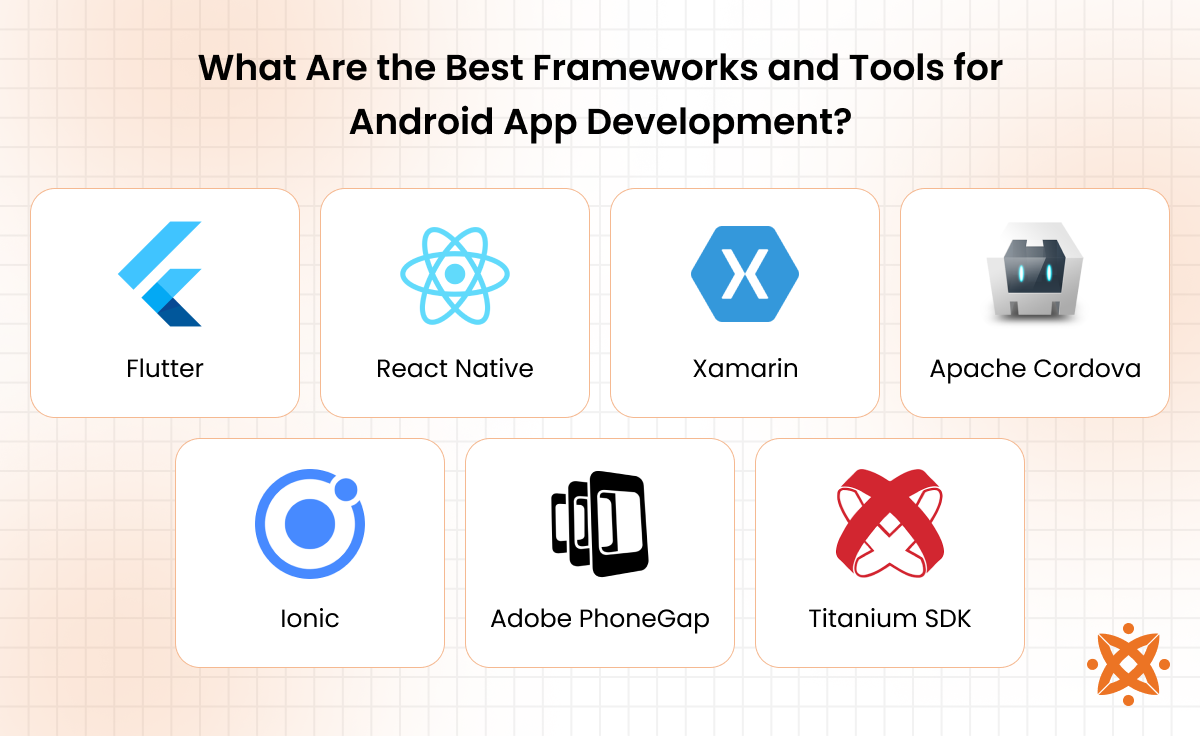
Flutter
Flutter builds Android and iOS apps using Dart and supports cross-platform development. It was first released in 2017 by Google. Flutter features hot reload for instant code updates and a widget-based UI system for custom designs. Developers use Android Studio or VS Code with the Flutter SDK to build applications.
React Native
React Native builds Android apps as a framework from Facebook. It started in 2015. React Native uses JavaScript, enables cross-platform coding for Android and iOS, and suits web coders with quick setup. It requires VS Code.
Xamarin
Xamarin develops Android apps as a Microsoft framework for cross-platform mobile development, launched in 2011. It uses C# and .NET, enabling a single codebase for Android, iOS, and Windows apps. Xamarin integrates with Visual Studio and requires the Xamarin SDK for development.
Apache Cordova
Apache Cordova builds Android apps as an open-source framework originally developed by Nitobi in 2009. It uses HTML, CSS, and JavaScript to create cross-platform applications for Android and iOS. Cordova is easy to learn and allows developers to use a text editor and CLI tools for app development.
Ionic
Ionic creates Android apps as a cross-platform framework developed by Drifty in 2013. It relies on HTML, CSS, and JavaScript and integrates with Angular, React, and Vue for web-based mobile applications. Ionic is user-friendly, supports fast builds, and requires Ionic CLI for development.
Adobe PhoneGap
Adobe PhoneGap was an open-source mobile development framework originally created by Nitobi in 2009. It allowed developers to build Android and iOS apps using HTML, CSS, and JavaScript. PhoneGap was known for its easy setup and cross-platform capabilities, but it was discontinued in 2020. Development previously required PhoneGap CLI.
Titanium SDK
Titanium SDK develops Android apps as a cross-platform framework created by Appcelerator in 2008. It uses JavaScript and provides native UI components for a more responsive experience. Titanium requires moderate coding effort and uses Titanium Studio as its primary development environment.
How Does Android Studio Help in App Development?
Android Studio helps you develop Android apps by providing a dedicated workspace for coding, testing, and debugging. It includes a real-time emulator, allowing you to test apps on virtual devices before launching them.
The platform supports Java and Kotlin and offers built-in templates to speed up development. Its drag-and-drop layout editor makes UI design easier, while the Gradle build system helps you manage app performance and dependencies efficiently. These features enable you to build, improve, and test Android apps more effectively.
What Is the Difference Between Native and Cross-Platform Android Frameworks?
The main difference between native and cross-platform Android frameworks is that native frameworks build apps specifically for Android using Java or Kotlin, while cross-platform frameworks allow you to use a single codebase for both Android and iOS.
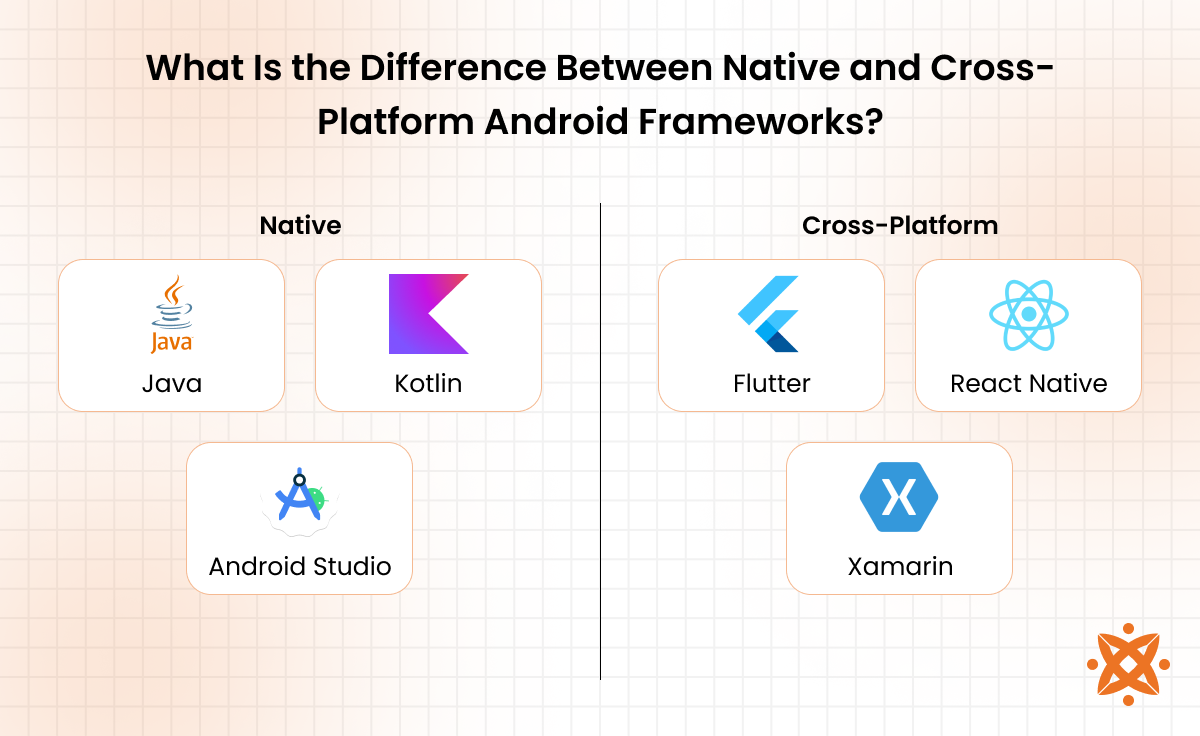
Native development provides better performance, smoother animations, and direct access to device hardware, making it ideal for high-performance apps, games, and complex user interfaces. In contrast, cross-platform development saves time by reusing code across platforms, which helps you reduce costs and speed up the development process.
You might choose a native framework if you need faster execution, deeper system integration, or platform-specific features. On the other hand, cross-platform frameworks work best when you want to reach a wider audience quickly, such as for business tools and content-based applications.
What Programming Languages Are Used for Android App Development?
The main programming languages used for Android app development are Kotlin, Java, C++, C#, Dart, Python, and JavaScript. Each language offers different features, strengths, and limitations based on development needs.
- Kotlin
- Java
- C++
- C#
- Dart
- Python
- JavaScript
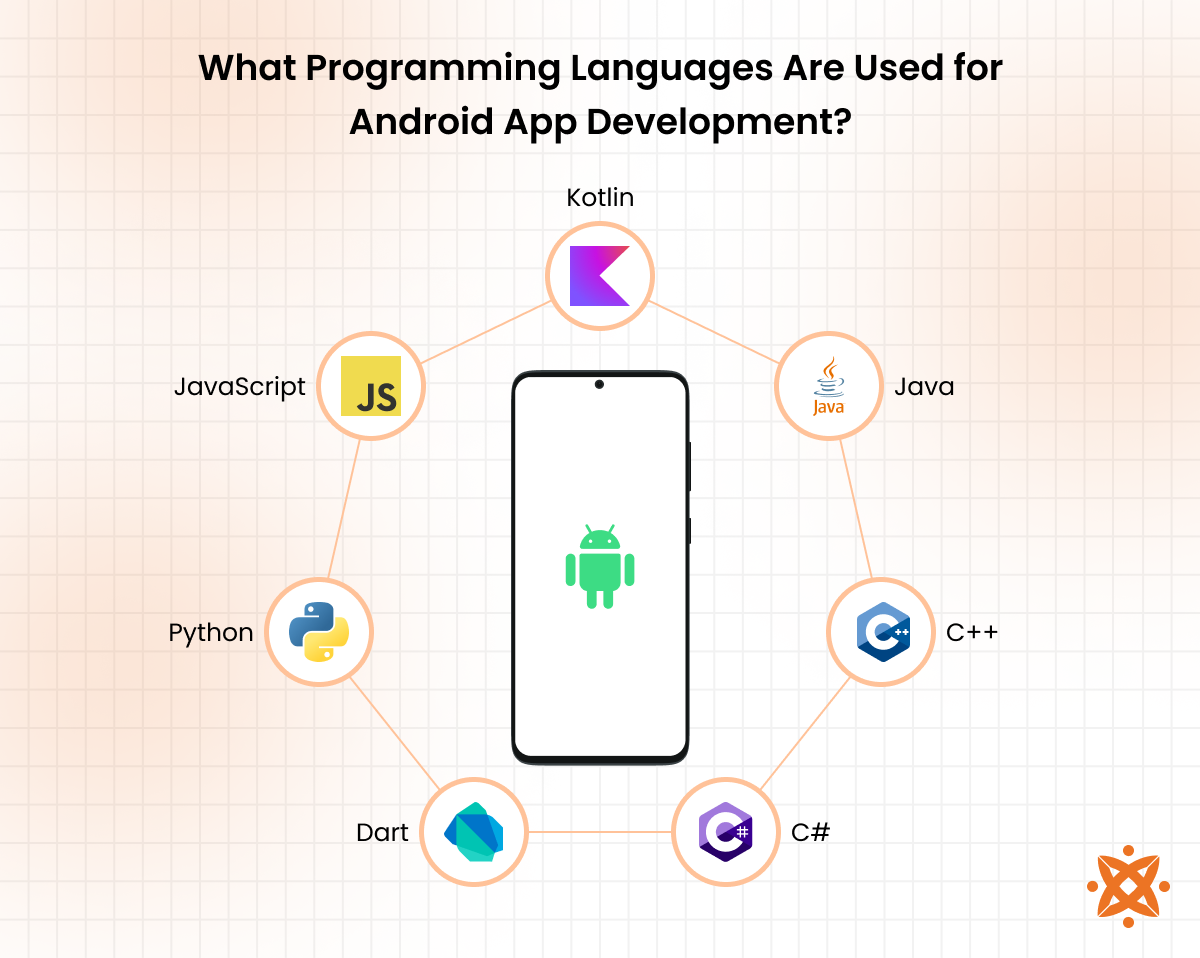
1. Kotlin
Kotlin is Google's official programming language for native Android development. Key features include concise syntax, null safety, and full Java interoperability. The main advantages are faster development, modern features, and reduced errors, while the drawbacks include slower compilation speed and a smaller learning resource base.
2. Java
Java is the original programming language for Android app development. It is known for platform independence, strong community support, and scalability. The key benefits of Java are reliability, widespread adoption, and extensive learning resources, but it has verbose syntax and slower feature updates compared to Kotlin.
3. C++
C++ is a high-performance programming language used for complex Android components, gaming, and real-time processing. It offers direct hardware access, efficient memory management, and native performance, making it suitable for resource-intensive applications. However, its complex syntax and steep learning curve make development more challenging.
4. C#
C# is used for Android development through Microsoft's Xamarin framework, enabling cross-platform app development. It supports object-oriented programming, garbage collection, and .NET integration. The key advantages are easier code maintenance, better memory management, and seamless integration with .NET, but it relies on Microsoft's ecosystem and requires Xamarin for mobile app deployment.
5. Dart
Dart is the programming language behind Google's Flutter framework for Android and cross-platform development. It features hot reload, native UI components, and smooth animations. Dart's main benefits include faster development, a single codebase for multiple platforms, and high-performance UI rendering, but it has limited adoption outside Flutter and a smaller community.
6. Python
Python is used for Android development through frameworks like Kivy and BeeWare, making it suitable for AI-driven and automation-based applications. It features simple syntax, strong AI/ML capabilities, and extensive libraries. The advantages of Python include easy learning, rapid prototyping, and strong backend integration, but it suffers from slower execution and limited access to native Android APIs.
7. JavaScript
JavaScript enables Android app development via frameworks like React Native, Ionic, and Cordova. It provides cross-platform compatibility, reusable UI components, and web-based development. The key benefits are faster development and wide community support, but it has performance limitations for native functionalities and dependency on third-party frameworks.
Can You Develop an Android App with AI Like ChatGPT?
No, you cannot directly develop an Android app with AI like ChatGPT because ChatGPT is a language model, not a standalone development tool. However, developers can integrate ChatGPT into an Android app using APIs such as OpenAI's GPT API. This involves coding the app in Kotlin or Java to send user inputs to the AI, process responses, and display them in real time. This integration enables AI-powered features like chatbots, virtual assistants, and automated text generation within an Android app.
How to Develop an Android App?
To develop an Android app, you need to follow these key steps:
1 Define Your App Concept
Start by identifying why you're building the app, who will use it, and what features it needs. Conduct market research to understand your competitors and validate your idea.
2 Choose the Development Approach
Decide whether you want to build a native app for Android only or a cross-platform app that works on both Android and iOS. Your choice will depend on your budget, performance needs, and long-term goals.
3 Select the Tech Stack
Choose a programming language that fits your project. Kotlin or Java are best for native Android apps, while Flutter, React Native, or Xamarin let you develop for multiple platforms with one codebase.
4 Design Your App's User Interface (UI/UX)
Create wireframes and mockups to design a user-friendly, responsive, and visually appealing app. Your app should be easy to navigate and provide a smooth experience.
5 Set Up the Development Environment
Install Android Studio, set up the Android SDK, and configure an emulator or connect a physical device to test your app as you build it.
6 Develop Your App
Write clean and efficient code for your app's front-end interface and back-end logic. If your app needs real-time data, integrate APIs or cloud-based services.
7 Test Your App
Run unit, integration, and user tests to fix bugs and ensure smooth performance on different devices. Pay attention to loading speeds and responsiveness.
8 Prepare Your App for Launch
Generate a signed APK, optimise your app's metadata, and ensure it meets Google Play Store guidelines before submitting it.
8 Launch and Track Performance
Publish your app on the Google Play Store, monitor user reviews, and track performance with analytics tools. This helps you understand what's working and what needs improvement.
9 Maintain and Update Your App
Keep your app running smoothly by fixing bugs, improving security, and adding new features based on user feedback. Regular updates help keep users engaged.
What Is the Difference Between Android App Development and iOS App Development?
The main difference between Android app development and iOS app development is the operating system and programming languages used. Android apps are developed for devices running the Android OS using Kotlin or Java, while iOS apps are built for Apple's iOS using Swift or Objective-C.
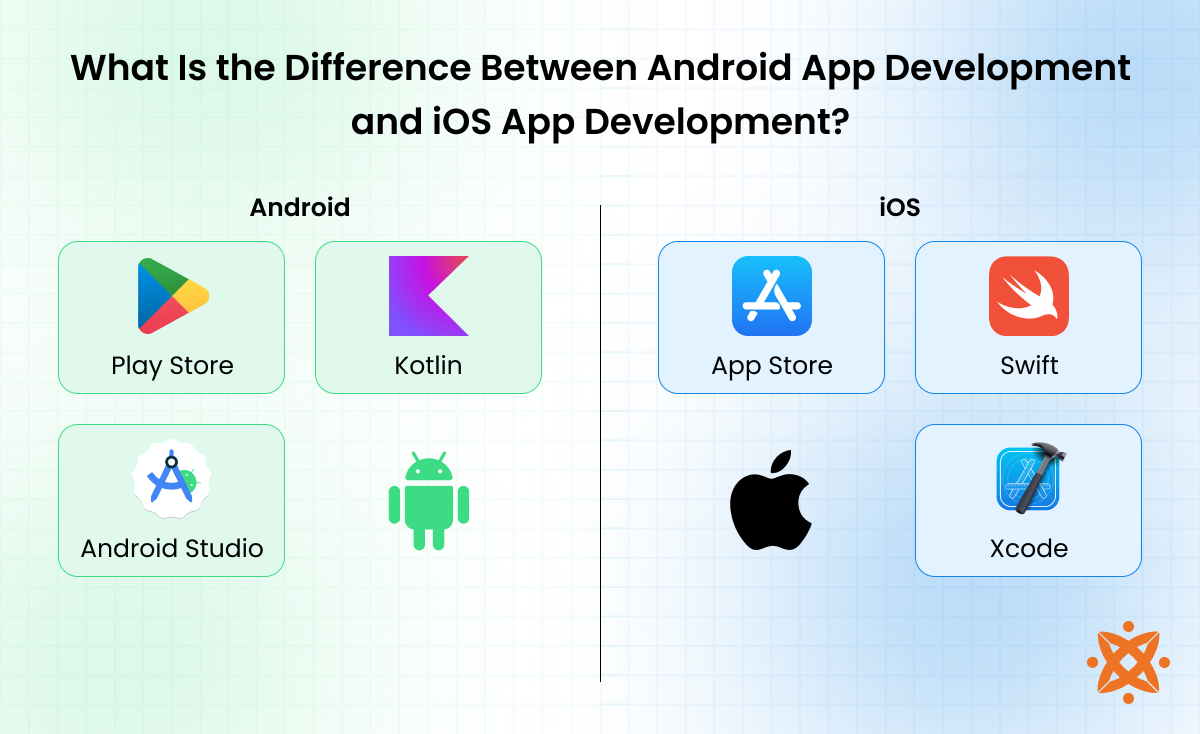
Other key differences include development environments, app distribution, and design guidelines. You will use Android Studio to build Android apps, whereas Xcode is required for iOS development. Publishing on the Google Play Store is generally easier, as it has a less strict approval process than Apple's App Store, which enforces tighter security and design standards.
Android offers more customisation and runs on a wider variety of devices, while iOS ensures better optimisation by being limited to Apple's controlled hardware ecosystem. You may need to test Android apps across multiple screen sizes and manufacturers, whereas iOS apps are developed for a smaller range of devices, making optimisation simpler.
What is the Difference Between Android App Development and Web Development?
The main difference between Android app development and web development is that Android app development focuses on building mobile applications for Android devices, while web development involves creating websites and web applications accessible through browsers.
Android apps work on smartphones, tablets, and other Android-powered devices and must be installed from the Google Play Store or other sources. In contrast, web applications run on any device with an internet connection, allowing you to access them instantly without installation.
How to Choose the Right Android App Development Agency?
Choosing the right Android app development agency ensures you get a high-quality app that meets your business needs. Consider these key factors:
- Experience and Portfolio – Check the agency's past projects to assess their expertise in Android app development.
- Technical Skills – Ensure they have developers proficient in Kotlin, Java, and cross-platform frameworks like Flutter or React Native.
- Client Reviews and Testimonials – Look at feedback from previous clients to gauge reliability and service quality.
- Industry Knowledge – Choose an agency that understands your business sector and app requirements.
- Post-Launch Support – Ensure they offer maintenance, updates, and bug fixes after deployment.
- Transparent Pricing – Get a clear breakdown of costs and ensure there are no hidden fees.
- Communication and Collaboration – Select an agency that provides regular updates and involves you in the development process.
Finding the right agency makes a significant difference in your app's success. Intelivita is a trusted choice for Android app development, offering years of experience, a skilled team, and end-to-end development services. Get in touch today to discuss your project!
How Do Android Apps Make Money?
To make money, your Android app can use several monetisation methods, including in-app advertising, paid apps, in-app purchases, subscriptions, and affiliate marketing. Each method works differently based on your app type and audience engagement.
In-app advertising lets you earn money by displaying banner ads, video ads, or rewarded ads. Platforms like Google AdMob pay based on ad views or clicks. This works well for free apps but may affect user experience.
Paid apps require users to pay before downloading. If you offer premium features or specialised tools, this model ensures upfront revenue but may limit downloads.
In-app purchases allow you to sell extra features, virtual goods, or premium content. This is a common approach in gaming, productivity, and entertainment apps.
Subscriptions provide a steady income stream by charging users monthly or yearly for access to exclusive content or services. This is ideal if you run a streaming, fitness, or educational app.
Affiliate marketing and sponsorships enable you to earn by promoting third-party products or services within your app. This works best if you have a niche audience.
Never Miss an Update From Us!
Sign up now and get notified when we publish a new article!
Tuhin Bhatt
Co-Founder
Tuhin Bhatt is a co-founder of Intelivita, a leading Web and Mobile App Development Company with offices in the UK and India. He has expertise in Mobile Game, iOS, Android, AR and VR app technologies. With flawless command over mobile app development, Tuhin also has a passion to share his expertise with clients and other enthusiasts. His write-ups are usually based on Technology, Leadership, and Entrepreneurship.
